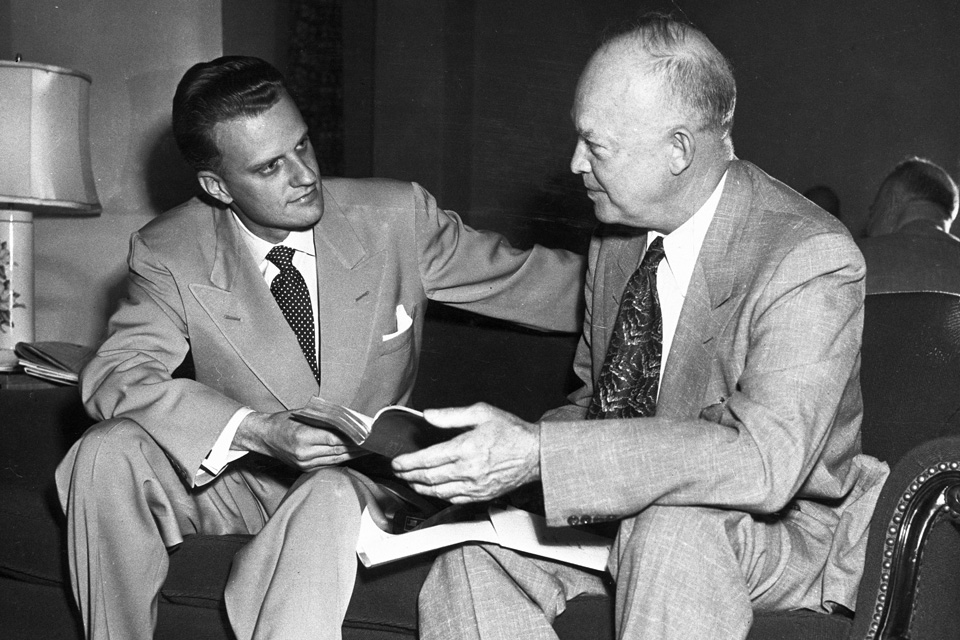
In his autobiography,
Billy Graham wrote about how he got the call of a lifetime in 1953 from
President Dwight D. Eisenhower. When Eisenhower was elected, he called Billy to
help him write his inaugural speech. Even though he wasn’t a believer, the
president wanted Billy to help him pick appropriate Bible verses for the speech.
A friendship blossomed
between the two and Eisenhower asked for Graham’s counsel at many points in his
presidency. Billy, being the great evangelist, prayed for the right moment to
present the Gospel to Eisenhower and it finally came. One day Eisenhower
invited Billy to tour Gettysburg battlefield with him, “Billy, do you believe
in Heaven?’ he asked. “Yes, sir, I do,” Graham answered. “Give me your reasons,”
Eisenhower asked. Billy wrote, “With my New Testament open, I gave the
President a guided tour through the Scriptures that spoke of the future life.”
The President did not make
a commitment that day and for years Billy wondered about Eisenhower’s salvation.
He finally got the answer, years later in 1968. Graham met with Eisenhower at
Walter Reed hospital a few months before the president passed away. Graham
recalls the conversation:
“As my scheduled twenty
minutes with him extended to thirty, he asked the doctor and nurses to leave
us. Propped up on pillows amidst intravenous tubes, he took my hand and looked
into my eyes. ‘Billy, you’ve told me how to be sure my sins are forgiven and
that I’m going to Heaven. Would you tell me again?’ I took out my New Testament
and read to him the familiar Gospel verses. Then, my hand still in his, I
prayed briefly. ‘Thank you,’ he said. ‘I’m ready’”[1]
When I read that story, it
reminded me of what happened to Paul and Barnabas while they were preaching in Cyprus.
Paul stormed the island with the Gospel and eventually gained an audience with
the Roman governor, a man named Sergius Paulus, who according to Acts 13:7, was
“a man of intelligence, who summoned Barnabas and Saul and sought to hear the
word of God.” At first Paul was opposed by sorcerer in the governor’s cabinet,
a nefarious character named Elymas the magician. Undeterred, Paul rebuked Elymas
and blinded him by the power of the Holy Spirit and “when Sergius Paulus saw what had occurred,
he was astonished at the teaching of the Lord” (13:12).
So what are we to take
away from these two stories: First, the
Gospel is for everyone. Both Billy Graham and Paul got to preach to people
in positions of high authority. Often times, I think we make the mistake of
assuming that the Gospel is just for a certain class of people—the poor, the
outcasts and the lower ranks of society. The reality is that everyone, even
presidents and kings, need the Gospel because they too are sinners in need of a
Savior. We may not have an audience with our national leaders, but we can certainly
pray for their salvation (1 Tim. 2:2).
Second we learn that, soul winning is spiritual warfare. It
took the blinding of the false prophet to open the eyes of Sergius Paulus. In
fact, this is the only convert that Luke mentions from their efforts on Cyprus.
Like Jesus’ parable in Luke 15, Paul and
Barnabas had left the ninety-nine to go after the one and Paul had to fight off
the son of the devil to win just one soul. Soul winning is not for the faint of
heart. When you share Christ expect all kinds of Satanic opposition. The good
news is that “greater is He that is within me that he that is in the world” (1
John 4:4). -DM
No comments:
Post a Comment